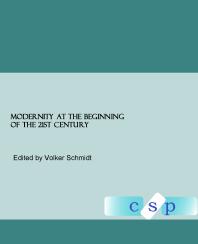(Ebook) Modernity at the Beginning of the 21st Century by Volker Schmidt ISBN 9781443802253, 1443802255
Modernity is back on sociology's agenda. From the beginnings of sociology as an academic discipline, questions surrounding the meaning and consequences of modernity have fascinated generations of sociologists. The initial interest in the concept was inspired by a sense of a deep rupture (and crisis) afflicting European society, a sense that society was approaching something fundamentally different from the past, an entirely new form of societal organization that bore little resemblance to anything known before. Where exactly this transformation was headed was by no means clear, but around the 18th century a growing number of European intellectuals and scholars realized that the changes that had been in the making since the late 15th century were irreversible and could not be contained in any particular region or confined to particular sectors of society, but would ultimately transform all spheres of life. Like other thinkers, sociologists observed this transformation with awe, and their attitude towards it has always been ambivalent. The 20th century, during which modernity gradually began to break through globally, was also a century during which many sociologists became increasingly disillusioned with the promises of "the modern project". But with the exhaustion of the energies of "postmodernism", the intellectual movement that wanted to bury modernity, the interest in modernity began to resurface again; not least because it became increasingly clear that the world is far from approaching a societal condition pointing systematically beyond modernity. Instead, we are witnessing an intensification of modernization processes around the world.But what is modernity, anyway? The aim of the present volume is to contribute to the ongoing discussion about the meaning of modernity and about the significance of modernization processes in non-Western societies. As befits a subject matter as controversial and complex at this one, the book's chapters offer no conclusive answers to the questions they raise and address. The debate about modernity must and will continue, and one hopes that it will be conducted in an atmosphere of mutual respect despite sometimes fierce disagreement between the participants. For only if we listen to each other can we make genuine intellectual progress.
*Free conversion of into popular formats such as PDF, DOCX, DOC, AZW, EPUB, and MOBI after payment.


